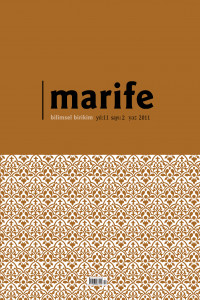The Nature of Ishari (Mystical) Tafsir, It’s Legitimacy And It’s Difference From The Interpretation of Batini (Esoterical)
Öz
Verses of The Holy Qur’an were sent as a guide of leading the people to the right road.
Everyone who knows Arabic (the language of the Holy Qur’an) can understand the literal
meanings of verses. The Holy Qur’an recommends that to Muslims a blief and practise
whole that takes into account hereafter. Therefore be easily understandable by the people
is by its nature and wisdom. However, revelations of the Holy Qur’an (the words of God)
aren’t possible to limit only the literal and apparent sense. Firstly, The Holy Qur’an
indicate that the verses carry deep and multidimensional meanings beyond the appear
meanings. In addition, it is possible to find the evidences about this topic, in the hadith
(the words of Prophet Mohammad) and the words of sahabe (prophet’s companions). In
the historical process, tafsir made outside of the apparent meanings of verses referred to
various names according to their types as “ishari”, “mystical”, “esoterical” and
“enlightened”. This type of interpretations, if they are not against the Holy Qur’an and the
Sunnah, were regarded as acceptable by Islamic scholars. The purpose of this article to
determine the nature of “ishari-mystical tafsir”, its location of in the tradition of
interpretation and its difference from the interpretation of members of Shiite-Bâtınî sect .
Key Words: Tafsir tradition, interpretation of Qur’an, mystical (ishari) commentary,
esoteric (Shiite-Batıni) interpretation, esoterical sect members.
Öz
Kur’ân ayetleri, insanları doğru yola götüren bir rehber olarak indirilmiştir. Kur’ân’ın dili olan Arapça’yı bilen herkes, ayetlerin lafzen ne ifade ettiğini anlayabilmektedir. İnananlarına dünya-ahiret boyutlu bir inanç-pratik bütünü öneren Kur’ân’ın, insanlar tarafından kolayca anlaşılabilir olması, onun doğası ve hikmeti gereğidir. Bununla birlikte Allah’ın kelamı olan Kur’ân ayetlerini, sadece lafzî ve zâhirî manalarıyla sınırlamak da mümkün değildir. Ayetlerin, görünen anlamları ötesinde derin ve çok boyutlu manalar taşıdığına; yine bizzat Kur’ân ayetleri işaret etmektedir. Hz. Peygamber’in hadîsleri ve sahabe sözlerinde de ilgili deliller bulmak mümkündür. Tarihsel süreçte, ayetlerin zâhirî anlamları dışında yapılan çeşitli yorumlar; mahiyetlerine göre işârî, sûfî, bâtınî, feyzî gibi adlarla anılagelmiş ve bu tür tefsirlerin Kur’ân ve sünnetle tearuza düşmeyen kısmı İslam alimleri tarafından makbul sayılmıştır. Bu makalenin amacı, İşârî tefsir’in mahiyetini ve tefsir geleneğindeki yerini tespit etmek, dolayısıyla İslam çizgisinden çıkan Şîî-Bâtınî yorumlarla olan ve çoğu zaman göz ardı edilen farkını da ortaya koymaktır
Anahtar Kelimeler
Tefsir geleneği Kur’ân yorumu işârî tefsir Şîî-Bâtınî yorum Bâtınîler
Ayrıntılar
| Diğer ID | JA72AN86CU |
|---|---|
| Bölüm | Araştırma Makalesi |
| Yazarlar | |
| Yayımlanma Tarihi | 31 Ağustos 2011 |
| Yayımlandığı Sayı | Yıl 2011Cilt: 11 Sayı: 2 |
Bu eser Creative Commons Alıntı-GayriTicari-Türetilemez 4.0 Uluslararası Lisansı ile lisanslanmıştır.


